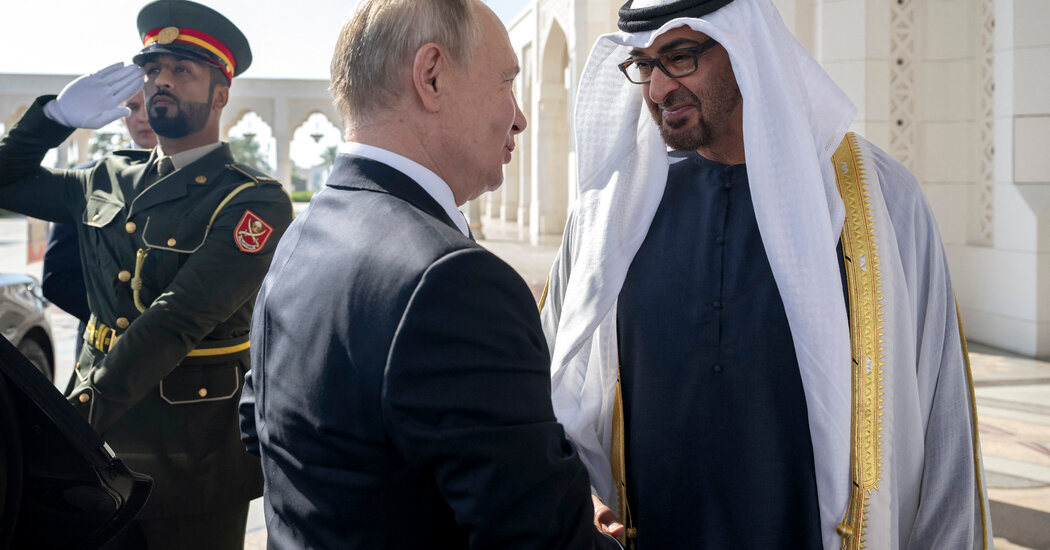His plane flanked by four fighter jets, President Vladimir V. Putin of Russia began a rare trip on Wednesday to the United Arab Emirates and Saudi Arabia, two oil-rich Gulf nations which have resisted pressure to take sides in the Ukraine war.
Mr. Putin said his talks in the region would touch on international crises, primarily Israel’s two-month-old war with Hamas — a conflict that has played into his geopolitical aims by distracting Western leaders from the war in Ukraine.
The Emirati president, Sheikh Mohamed bin Zayed Al Nahyan, called Mr. Putin his “dear friend,” at the start of their talks, while the Russian leader praised the relationship between the two countries.
“Without doubt, I will inform you about the situation with the Ukrainian crisis,” Mr. Putin told the Emirati leader in televised remarks.
Upon arrival in the Emirati capital, Abu Dhabi, Mr. Putin was greeted with pomp: His limousine drove through the grounds of a sprawling palace flanked by camels and Arabian horses whose riders held Russian flags. Jets trailed the Russian tricolor in the sky and Mr. Putin was also welcomed with a 21-gun salute, the Emirati state news agency reported.
Among the Emirati officials in the delegation that received the Russian leader was Sultan Al Jaber, the head of Abu Dhabi’s state oil company and the president of COP28, the United Nations climate summit which is currently underway in the neighboring emirate of Dubai, according to the state news agency.
Mr. Putin’s trip, announced unexpectedly by the Kremlin on Tuesday, came amid signs of eroding support in the United States for Ukraine, which is frantically trying to secure more Western aid for its effort to drive Russian forces from its territory.
Before his visit to Abu Dhabi, Mr. Putin had not traveled beyond China, Iran and the former Soviet states since he launched the full-scale invasion of Ukraine in February 2022.
By late Wednesday afternoon, he had left the Emirates for Saudi Arabia and talks with Crown Prince Mohammed bin Salman, the de facto leader of the kingdom.
A prominent Emirati political scientist, Abdulkhaleq Abdulla, downplayed the significance of Mr. Putin’s visit for the Emirates, describing it as “symbolic.”
Mr. Abdulla said that the Russian leader “has very few friends,” while the Emirates “wants to be a friend of everybody.”
In recent years, the Emirates has designed its foreign policy around hedging against its dependency on the United States.
The Emirati leader has traveled to Russia twice over the past two years, and his country was celebrated as the guest of honor at Mr. Putin’s flagship investment forum in June.
The Saudi crown prince also has maintained close links to Mr. Putin since the invasion of Ukraine despite pressure from Western powers to isolate Russia. He has positioned himself as a potential mediator in the conflict.
Mr. Putin’s talks in the Middle East were the first in a series of diplomatic meetings planned for this week. On Thursday in Moscow, the Russian leader will host President Ebrahim Raisi of Iran, the leader of another key player in the region.
The outbreak of the war in Gaza has diverted attention away from Ukraine and allowed the Kremlin to attract the sympathy of people in many developing countries where support for the Palestinian cause is widespread.
Mr. Putin condemned the Oct. 7 attack on Israel by Hamas, the armed group that rules Gaza, which killed 1,200 people, according to the Israeli authorities. He called it a terrorist act and tried to preserve working ties with Israel while also arguing that the dominance of Western elites allowed for the crisis to happen in the first place.
Grief and anger have spread in Arab countries since the Israeli military responded to the Hamas attack by bombarding and invading Gaza, where more than 2 million Palestinians live.
The assault has killed more than 16,000 people in Gaza — a bombing campaign of an intensity that has few precedents in this century. In protests across the Middle East, people have expressed fury not only at Israel but also at the United States, Israel’s main international backer.
“We’ve seen anti-Americanism at an all-time high,” said Mr. Abdulla, the Emirati political scientist.
But it is unclear how much Mr. Putin will be able to gain from that, though.
Mr. Abdulla said that despite the anger at the United States, one of the main messages Arab states had received since the war was that “America is back” — militarily and politically — after a long period during which regional leaders worried that U.S. interest in their region was waning.
“There is very little that Putin can bring to the situation in Gaza,” Mr. Abdulla said, describing Russia as “irrelevant” to that war, in which the United States has been the dominant international player.
#Putin #Travels #U.A.E #Saudi #Arabia #Rare #Trip #Mideast



